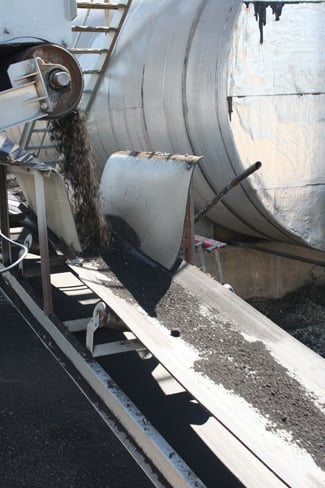Asphalt pavement is a mix of coarse aggregate stone, sand, fine aggregate and asphalt cement, which is petroleum based. Depending on the asphalt manufacturing process and temperatures used, it is either considered hot mix asphalt or warm mix asphalt.
 Hot Mix Asphalt
Hot Mix Asphalt
Hot mix asphalt or HMA is the designation given to asphalt mixtures that are heated and poured at temperatures between 300 and 350 degrees Fahrenheit. This type of asphalt is the most commonly used asphalt type in the United States for highways, interstates and roads due to its flexibility, weather resistance and ability to repel water. Hot mix asphalt is used when the outside air temperature is above 40 degrees, due to its propensity for rapid cooling.
HMA can be classified into three categories, including dense-graded mixes, stone matrix asphalt and open grade mixes. Dense-grade mixes are categorized according to the sizes of the aggregate used and fall into two subcategories, including fine-graded and coarse-graded. Fine-graded dense-grade mixes contain a higher percentage of sand and small stones compared to its coarse-graded counterpart. This type of mix can be used to pave high-traffic roadways, interstates and highways.
Stone matrix asphalt was first manufactured in Europe and specifically designed to improve tire grip on road surfaces and prevent rutting. It was first used in the United States in 1988. It is manufactured with a higher percentage of asphalt cement than other types and contains asphalt binders along with certain types of fibers. This type of asphalt is relatively expensive when compared to other asphalt pavements and is generally only used on very large projects.
There are two types of open-graded mixes used for asphalt. The first type is called friction course and is used to construct the top layer of pavement. It must contain at least 15 percent air voids. The second type is known as asphalt treated permeable bases, and it is used specifically for its ability to drain water away from the top layer of pavement. It is used as a base for dense-graded asphalt and Portland cement surfaces.
Warm Mix Asphalt
Warm mix asphalt or WMA is currently used in about 30 percent of all paving projects. WMA is manufactured at temperatures between 200 and 250 degrees Fahrenheit. It uses less fossil fuels and resources in its manufacturing process and includes additional binding materials and additives, including wax, emulsions and zeolites for easier pouring and spreading at low temperature. WMA is less costly to produce than HMA.Because warm mix asphalt is manufactured and shipped at lower temperatures, it does not cool as fast as its hotter counterpart. Therefore, it can be shipped over longer distances and used outside of the normal paving and road construction months. It can be used to pave roads, highways, interstates, cart paths, driveways and walking paths during the day or at night.
WMA is also better for the environment and worker health. Because it is poured and laid at lower temperatures, there is less dust, smoke and fumes. This means that it can be safely used in tunnels and on days when air quality is low and other types of asphalt resurfacing and paving jobs would be delayed.
Wolf Paving’s Asphalt Manufacturing Process
Here at Wolf Paving, we manufacture our own custom asphalt mixes using sand, limestone and gravel from pits that we own and operate. The gravel, sand and limestone is transported from our pits to one of our two asphalt manufacturing plants in either Sun Prairie or Oconomowoc where it is poured into electronically controlled hoppers. The aggregate is then dried and mixed with oil and recycled asphalt to produce asphalt mix. We currently produce hot and warm asphalt mix.To learn more about our asphalt manufacturing, warm and hot mix asphalt or to schedule a consultation and quote, please call us. For the Milwaukee area, call 262-965-2121. For the Madison area, call 608-249-7931




